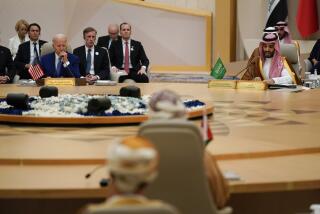John McCain visits Syria; EU agrees to relax arms ban
LONDON â Diplomatic pressure on Syrian President Bashar Assad escalated Monday, as a divided European Union agreed to relax a ban on weapons shipments to anti-Assad forces and U.S. Sen. John McCain met with insurgent commanders during a surprise visit to the country.
Meanwhile, top U.S. and Russian diplomats met in Paris in a bid to solidify plans for a peace conference that both nations view as the only hope for a diplomatic solution to the Syrian crisis, which has already left tens of thousands of people dead and threatens to spark a regional conflagration. U.S. Secretary of State John F. Kerry and his Russian counterpart, Sergei Lavrov, have yet to set a date for the conference or announce who will be attending the session in Geneva.
McCain (R-Ariz.), a leading advocate of arming the Syrian opposition, did not comment on his dramatic entry into rebel-held territory, but a pro-opposition group that helped arrange the trip said the senator met with Gen. Salim Idriss, who heads the Supreme Military Council of the Free Syrian Army, a loose confederation of rebel factions.
McCain also met with 18 commanders from rebel battalions across Syria, according to the Syrian Emergency Task Force, which assisted in facilitating the visit. The rebels repeated previous requests for heavy weapons, a no-fly zone that would nullify the governmentâs air power, and, in a new twist, airstrikes on Hezbollah, the Lebanese group that has dispatched militiamen to fight on Assadâs behalf.
The rebel commanders told McCain, âThey donât need more pizza, they need weapons,â Elizabeth OâBagy, political director for the task force, said in a phone interview from Turkey.
The Obama administration has been hesitant to arm the opposition, fearing that weapons could fall into the hands of Al Qaeda-linked extremists.
Both the McCain trip and Europeâs lifting of the embargo seemed at least partially designed to heighten pressure on Assad before the upcoming Geneva peace conference. The Syrian government has made battlefield gains in recent months, strengthening its hand against an opposition alliance that remains fractured and riven with discord. It is still unclear which group will represent the opposition at the U.S.- and Russian-sponsored peace talks.
The United States and its allies want Assad to agree to step down and give way to a transitional government. But Assad and his chief allies, Russia and Iran, have balked at any suggestion that Assad must resign as a precondition for negotiations.
In Brussels, European foreign ministers agreed after a marathon meeting to relax their embargo on arming Syrian rebels. They also said that no weapons would be shipped before Aug. 1, at the earliest.
The late-night decision followed hours of contentious discussion among the European Unionâs 27 member nations and was intended to send a pointed message to Assad about Western resolve against him. The delay in actually shipping any arms to rebels also reflected the divisions within the EU over how deeply it should get involved in the fight.
Britain and France, the EUâs two largest military powers, pushed strongly to end the arms ban, arguing that the time had come for more than just ânonlethal assistanceâ to rebels. Other countries such as Austria resisted, worried that weapons might fall into the hands of extremists.
EU foreign ministers raced to find a compromise and to present a united front, mindful that their blanket arms embargo was scheduled to expire automatically Friday night.
âIt was important for Europe to send a clear signal to the Assad regime that it has to negotiate seriously, and that all options remain on the table if it refuses to do so,â British Foreign Secretary William Hague said. âTonight EU nations have done just that.â
Hague acknowledged that there was no immediate plan by the European Union as a whole or by individual EU countries, including his own, to dispatch weapons. And if arms do get shipped, the countries providing them must enact safeguards to ensure that the weapons reach only units under the umbrella of the Western-backed Syrian National Coalition and do not get intercepted or passed on to more radical groups.
The EU foreign ministers said that they would review their decision Aug. 1, which in effect means that no materiel will make its way to Syria from Europe before that date. Officials hope that by then there might be diplomatic breakthroughs.
Other sanctions on Assadâs regime, including economic ones, are to remain in place.
The United Nations Human Rights Council has already passed several resolutions condemning the death, rape and torture of civilians during the more than two-year conflict, which has claimed 80,000 lives.
Henry Chu reported from London, Patrick J. McDonnell from Beirut, and Times staff writer Matt Pearce in Los Angeles contributed to this report.
More to Read
Sign up for Essential California
The most important California stories and recommendations in your inbox every morning.
You may occasionally receive promotional content from the Los Angeles Times.











